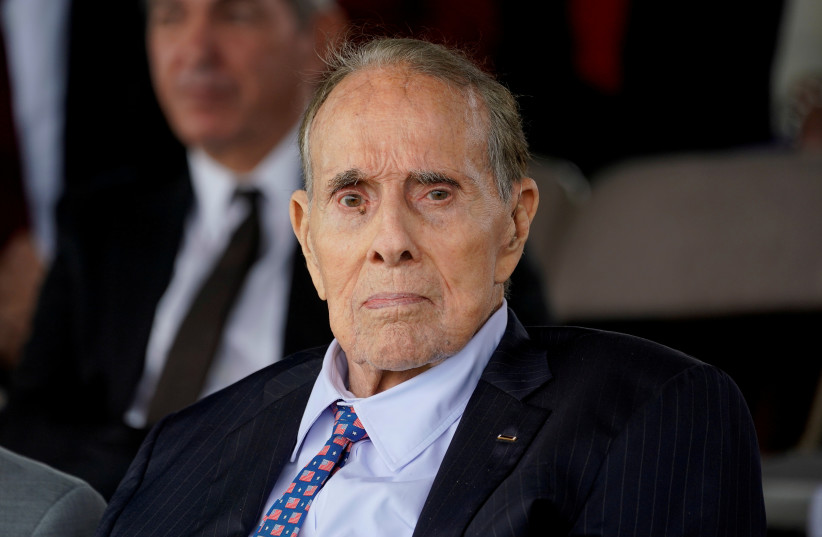Bob Dole, who died Sunday at 98, was a true war hero, a giant of the Senate and a dying breed of Republican. He mourned his party’s retreat from its traditional conservative roots and, in his last public words, called for a return to “unity,” but his legacy will be a mixed one, especially in the realm of US-Israel relations. The onetime harsh critic of Israeli policy had a conversion experience that seemed to occur after his presidential campaign ran into financial trouble.
In a posthumously published op-ed he wrote of the need to “prioritize principles over party and humanity over personal legacy” and to “find that unity again,” which propelled the nation to greatness.
He was uncomfortable with the new brand of conservatism and the direction his party was going. He felt he “couldn’t have made it” in today’s GOP.
But his plea for “unity” had a hollow ring. In the end, when he could have said and done something to breathe life in those words, he put partisanship first. He was the only living former GOP presidential nominee to endorse Donald Trump’s reelection and, in fact, voted twice for the man widely considered one of the most divisive, corrupt and incompetent presidents in American history.
Dole is mourned by some as a friend of Israel who pushed through Congress a law ordering the US Embassy in Israel moved from Tel Aviv to Jerusalem. It was not a sign of conversion or support for the Jewish state but a cynical political ploy by a politician who’d been one of Israel’s harshest critics for decades.

That was during his campaign for the presidency in 1996. He promised to be a more reliable and consistent friend of Israel than the incumbent, Bill Clinton. Dole had been one of Israel’s harshest critics until his presidential campaign started running dry and he turned to some wealthy Republican Jews for help.
When anti-Israel resolutions came before the Senate, it was not uncommon for them to be defeated 98-2. The two votes were often cast by Dole, the Republican leader, and Robert Byrd of West Virginia, the Democratic leader.
With the White House in sight, Dole became a born-again Likudnik and an election-eve convert to the cause. It brought in a lot of money from some deep-pocketed Jews, but not many votes. He got 13-16% of the Jewish vote, an improvement over George H.W. Bush four years earlier, compared to Clinton’s 78-83%, according to various exit polls.
Prime minister Yitzhak Rabin considered the Jerusalem legislation an attempt by his Likud opponents and AIPAC, both hostile to him and Clinton, to wreck the peace process with the Palestinians he and the president were pursuing. Dole announced it at the 1995 AIPAC policy conference with Rabin present despite the prime minister’s request not to do so lest he be dragged into American politics.
Rabin did not trust AIPAC and thought it was working with Republicans and opposition leader Benjamin Netanyahu against him.
Just five years earlier, Dole questioned the legitimacy of Israel’s presence in Jerusalem and, JTA reported, “demanded the repeal of a 1990 Senate resolution acknowledging that Jerusalem ‘is and should remain the capital of Israel.’” That year, 1990, Dole called for a 5% cut in aid to Israel and opposed $10 billion in loan guarantees for the resettlement of Soviet refugees, calling objections to his moves “shortsighted and selfish.”
The year before he’d blamed “Israeli actions” for the murder of an American intelligence officer by pro-Iranian terrorists in Lebanon. Jack Kemp, who would become Dole’s 1996 running mate, said the senator’s reaction reflected a “blame-Israel-first mentality.”
Prior to the Iraqi invasion of Kuwait, the senator went to Mosul to meet with Saddam Hussein. He reportedly apologized for offensive VOA broadcasts and told Saddam that the offending employee had been fired. He also told the “Butcher of Baghdad” that the US values his friendship, and later reported to president Bush that Saddam is a guy we can do business with.
Saddam tried to rally fellow Arabs to support his invasion of Kuwait by telling them he was fighting imperialism and Zionism, and he planned to liberate Palestine and Jerusalem. Only two people seemed to take him seriously: Yasser Arafat and Bob Dole. At one point, Dole suggested Saddam might be persuaded to give the Kuwaitis back their oil fields if the United States would force Israel to withdraw from the West Bank and Gaza.
Notwithstanding his record on Israel, Bob Dole was a giant of the Senate. He was intensely partisan but could work across party lines and knew how to make things happen. By contrast his current successor, Sen. Mitch McConnell (R-KY), has a well-earned reputation for making sure things do not happen.
Dole actively advocated for food stamps, child nutrition, persons with disabilities, veterans and international relief, all anathema in today’s GOP.
He returned to the Senate in a wheelchair years after leaving to ask his former colleagues to ratify the UN Convention on the Rights of Persons with Disabilities, modeled on the Americans with Disabilities Act. Then-senator John Kerry, also a wounded combat veteran, pleaded with colleagues “Don’t let senator Bob Dole down.” But they did. His fellow Republicans voted to kill it on the false charge that it would impinge on American sovereignty.
As Dole reflected later, the old Republican from Kansas couldn’t make it in today’s Senate.
